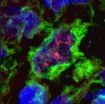(Press-News.org) The ripeness of fruit could determine how food-poisoning bacteria grow on them, according to scientists presenting their work at the Society for General Microbiology's Spring Conference in Dublin this week. Their work could lead to new strategies to improve food safety, bringing many health and economic benefits.
A wide range of fresh produce has been linked to outbreaks of Escherichia coli and Salmonella enterica including melons, jalapeño and serrano peppers, basil, lettuce, horseradish sprouts and tomatoes. Researchers at Imperial College London are looking at how these bacterial pathogens latch onto fruits and vegetables and establish themselves in the first place.
They have discovered that strains of Salmonella behave differently when attached to ripe and unripe tomatoes. "Bacteria that attach to ripe tomatoes produce an extensive network of filaments, which is not seen when they attach to the surface of unripe tomatoes. This could affect how they are maintained on the surface," explained Professor Gad Frankel who is leading the research. "We are not completely sure yet why this happens; it might be due to the surface properties of the tomatoes or alternatively the expression of ripening hormones."
This is just one example of the subtle interplay between food-poisoning microbes and the fresh produce they contaminate, that determines how pathogens become established in the food chain. "Apart from Salmonella, strains of E. coli are also particularly devious in the way they interact with plant surfaces. They have hair-like appendages and flagella they can use as hooks to successfully secure themselves onto things like salad leaves."
Although fresh fruits and vegetables are recognized as important vehicles that transmit harmful bacteria, they are still important components of a healthy and balanced diet. "By and large, raw fruits and vegetables are safe to eat and provide numerous health benefits. By working out the reasons behind sporadic outbreaks of infections, we can control these better and help maintain consumer confidence. By improving food safety we would also see important economical and health benefits."
Understanding how bacteria interact with fresh produce is a crucial but only the first step, explained Professor Frankel. "Translating research into new policies or methods for decontamination is the challenge for future studies," he said.
INFORMATION:
The time is ripe for Salmonella
2012-03-26
ELSE PRESS RELEASES FROM THIS DATE:
Henderson Properties Opens New Real Estate Office!
2012-03-26
Henderson Properties, a full service real estate company, last week, celebrated the opening of its Union County office in Indian Trail with a ribbon cutting and business networking event in conjunction with the Union County Chamber. The office, located at 4389 Indian Trail-Fairview Road, is the company's fourth branch location. Henderson Properties also has offices in South Charlotte, Lake Norman and Fort Mill.
The new office allows Henderson Properties real estate agents to better serve Union County residents.
In attendance was Kara Disotell, manager of Henderson ...
Wall Templeton & Haldrup, P.A., Welcomes Tommy Boger as Associate Attorney
2012-03-26
Wall Templeton & Haldrup, P. A. (www.WallTempleton.com), is pleased to announce Tommy Boger has joined the firm's Charleston office as an associate attorney. A graduate of Clemson University and the Charleston School of Law, Boger will focus his practice in the areas of complex litigation, construction, and commercial litigation.
Prior to attending law school, Boger worked in the mortgage industry as an online marketing manager and a loan consultant, originating residential mortgage loans in Columbia and Charleston, SC. He is a member of the South Carolina Bar and ...
Dental plaque bacteria may trigger blood clots
2012-03-26
Oral bacteria that escape into the bloodstream are able to cause blood clots and trigger life-threatening endocarditis. Further research could lead to new drugs to tackle infective heart disease, say scientists presenting their work at the Society for General Microbiology's Spring Conference in Dublin this week.
Streptococcus gordonii is a normal inhabitant of the mouth and contributes to plaque that forms on the surface of teeth. If these bacteria enter into the blood stream through bleeding gums they can start to wreak havoc by masquerading as human proteins.
Researchers ...
Using viruses to beat superbugs
2012-03-26
Viruses that can target and destroy bacteria have the potential to be an effective strategy for tackling hard-to-treat bacterial infections. The development of such novel therapies is being accelerated in response to growing antibiotic resistance, says Dr David Harper at the Society for General Microbiology's Spring Conference in Dublin.
Bacteriophages are viruses that can infect bacteria and multiply within them, breaking down the cell and destroying the bacteria - amplifying themselves in the process to deal with more bacteria. They are found everywhere including in ...
The Answer Company Becomes First ERP Reseller in Western Canada to Receive TEC Accreditation
2012-03-26
In a report published in recent weeks, Technology Evaluation Centers (TEC) announced that The Answer Company is the newest recipient of its Accreditation for Enterprise Resource Planning (ERP) Providers. The Answer Company, with offices in Vancouver, Calgary and Toronto, is the first ERP reseller in Western Canada to receive the rigorous TEC Accreditation, demonstrating its commitment to show prospective and existing clientele that users of the company's solutions are confident in the abilities and services.
Recent emphasis on the high failure rate of software implementations, ...
UCLA scientists identify novel pathway for T-cell activation in leprosy
2012-03-26
UCLA researchers pinpointed a new mechanism that potently activates T-cells, the group of white blood cells that play a major role in fighting infections.
Published March 25 online in Nature Medicine, the team specifically studied how dendritic cells, immune cells located at the site of infection, become more specialized to fight the leprosy pathogen known as Mycobacterium leprae. Dendritic cells, like scouts in the field of a military operation, deliver key information about an invading pathogen that helps activate the T-cells in launching a more effective attack.
It ...
Houston Lawyer Jay Jackson Earns a "Standing Ovation" for Volunteer Work with the State Bar of Texas
2012-03-26
Personal injury attorney Clyde J. "Jay" Jackson III, of Abraham, Watkins, Nichols, Sorrels, Agosto and Friend in Houston, Texas, was honored this month by the State Bar of Texas for his exceptional contributions in 2011 to the organization's legal education efforts. Mr. Jackson was one of only six volunteer lawyers who were recognized by the TexasBarCLE, the division of the bar that provides continuing legal education.
Explaining the significance of the "Standing Ovation" award, TexasBarCLE Director Patrick said, "All of our volunteers deserve ...
A hidden architecture: Researchers use novel methods to uncover gene mutations for common diseases
2012-03-26
BOSTON, MA—Human geneticists have long debated whether the genetic risk of the most common medical conditions derive from many rare mutations, each conferring a high degree of risk in different people, or common differences throughout the genome that modestly influence risk.
A new study by Brigham and Women's Hospital (BWH) researchers has harnessed data and new analysis tools to address this question in four common diseases: rheumatoid arthritis; celiac disease; coronary artery disease and myocardial infarction (heart attack); and type 2 diabetes.
The study will ...
Vaccinating chickens could prevent food-borne illness
2012-03-26
A vaccine could be developed to prevent Campylobacter being carried in chickens. This approach could drastically cut the number of cases of food poisoning, saving the UK economy millions each year, says an American scientist presenting his work at the Society for General Microbiology's Spring Conference in Dublin.
Food-borne illness costs the UK an estimated £2 billion each year. Campylobacter is the leading cause of food-borne illness and is responsible for about 30% of cases in the UK. Campylobacter jejuni was responsible for more than 371,000 estimated cases in England ...
Single molecules in a quantum movie
2012-03-26
The quantum physics of massive particles has intrigued physicists for more than 80 years, since it predicts that even complex particles can exhibit wave-like behaviour – in conflict with our everyday ideas of what is real or local. An international team of scientists now succeeded in shooting a movie which shows the build-up of a matter-wave interference pattern from single dye molecules which is so large (up to 0.1 mm) that you can easily see it with a camera.
This visualizes the dualities of particle and wave, randomness and determinism, locality and delocalization ...



